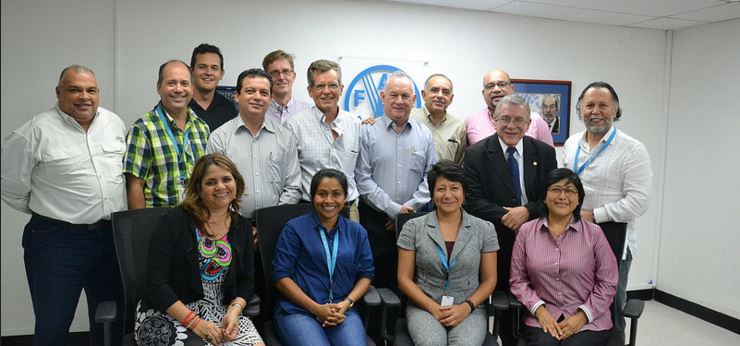- Guaranteeing agricultural health and food safety is key to achieving the food and nutrition security of the population.
- Regional agencies agreed to establish a mechanism for dialogue for the coordination of agricultural health and food safety actions, and the development of a joint action plan.

San Jose, Costa Rica, February 15, 2016 (IICA). Representatives of the United Nations Food and Agriculture Organization (FAO), the Tropical Agriculture Research and Higher Education Center (CATIE), the Inter-American Institute for Cooperation on Agriculture (IICA) and the International Regional Organization for Plant Protection and Animal Health (OIRSA) met to construct a joint work agenda designed to boost efforts and multiply results in the field of agricultural health and food safety, mainly in coordination with the Central American countries.
“The coordination of cooperation efforts and strategies between FAO and the regional agencies with regard to agricultural health and food safety will make it possible to expand the capabilities and actions of each party, and thereby achieve a bigger impact in supporting the countries in areas such as the development of national capabilities, health risk management, the strengthening of institutional frameworks and public health and safety policies, as well as the progress of programs for the prevention, control and eradication of diseases linked to agricultural health and food safety in the countries of the subregion,” remarked Tito Díaz, Coordinator of FAO’s Sub-regional Office for Mesoamerica.
“The challenges faced in the subregion today call for new types of measures, the inclusion of new stakeholders and greater coordination of efforts,” observed Lauriano Figueroa, OIRSA’s Regional Director of Food Safety.
At the regional level and as part of the work with the Central American Agricultural Council (CAC), the four international organizations are actively involved in the working groups on agricultural health and food safety, fruit-growing, coffee growing in Mesoamerica, as well as research, technology, transfer and innovation, thereby making major contributions to the national and regional agricultural goals of the countries of the subregion.
Noting that each agency represented had a mandate and a comparative advantage for the support it provided to the countries, Alejandra Díaz, IICA International Specialist in Agricultural Health and Food Safety emphasized the importance of having a comprehensive vision of the sanitary challenges facing the subregion, in order to promote the sharing of lessons learned by each agency, and take advantage of the joint cooperation frameworks that already exist in the region.
Elvin Britton, CATIE Representative in Panama, stressed the common elements of the institution building component of the programs of each agency, undoubtedly making it one of the areas that could benefit the most from the development of a coordinated action plan by the organizations.
The regional agencies agreed to work together in the following and other areas: conclusion of the continental action plan to combat the southern pine beetle and FOC-TR4 in bananas; the strengthening of surveillance strategies and the capabilities of the services dealing with classical swine fever in Haiti, the Dominican Republic and Cuba; the design of national brucellosis and tuberculosis programs; and the drafting of a work plan for tackling microbial resistance to veterinary drugs.
They also agreed to set up a mechanism for interinstitutional dialogue, to discuss and respond to emergencies, so that the organizations can act in a coordinated manner and make optimum use of the resources available.
The meeting was held to follow up on the agreements adopted at the meeting of the Commission on Livestock Development for Latin America and the Caribbean (CODEGALAC) in the Dominican Republic, the Regional Meeting of International Organizations for Integration and Cooperation in Agricultural Health and Food Safety in San Salvador, and the First Meeting of the Technical Group on Agricultural Health and Food Safety in Nicaragua.
Agricultural health and food safety for food and nutrition security
Strengthening the agricultural health and food safety services of the countries contributes to the production of safe, healthy food and the reduction of public health risks, thus making it a strategic element in achieving food and nutrition security.
According to the international organizations, the best strategy for reducing the risks that affect them is to develop regional programs for the prevention, control and eradication of pests and diseases, and to have national agricultural health and food safety systems of high technical quality.
The globalization of agricultural production, climate change, and increased trade are just some of the risks associated with pests and diseases in crops and animals. Such phenomena cost the region’s governments, producers, and consumers billions of dollars each year, constitute a threat to public health, and can undermine food security, livelihoods and trade.
More information: alejandra.diaz@iica.int










